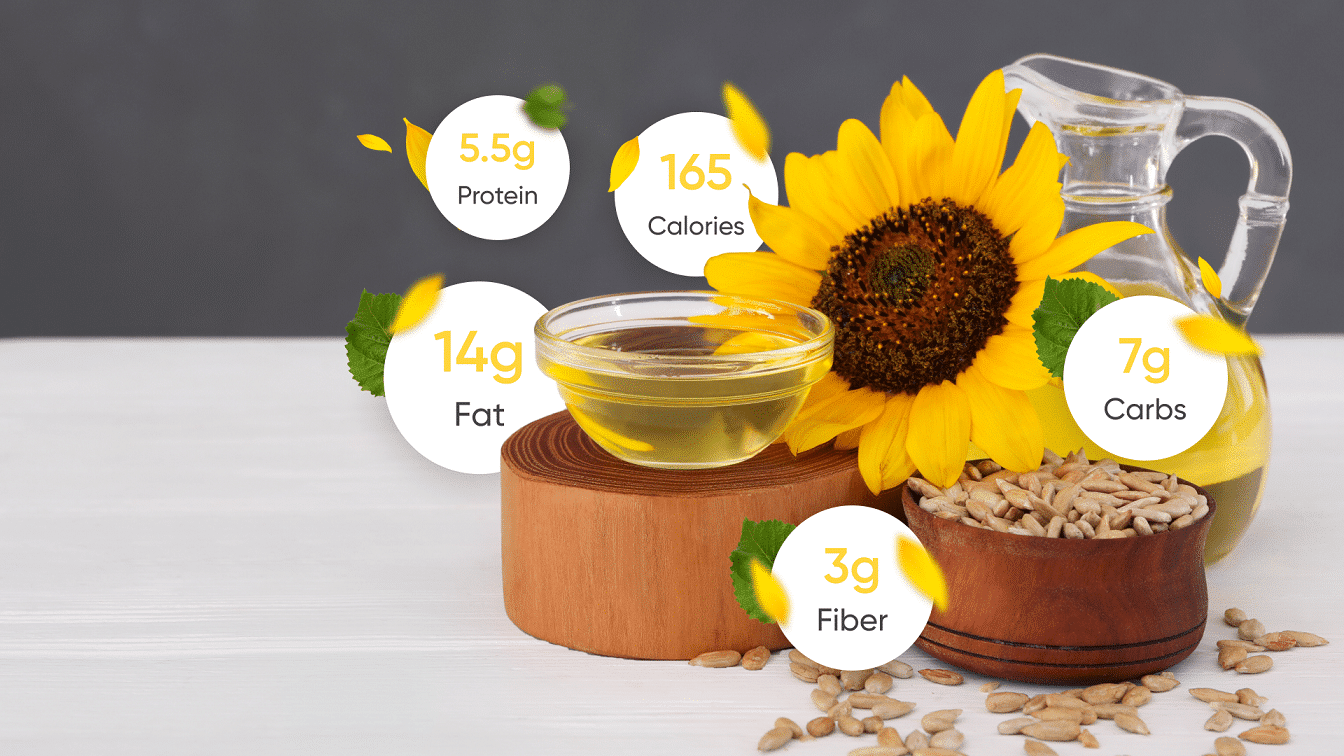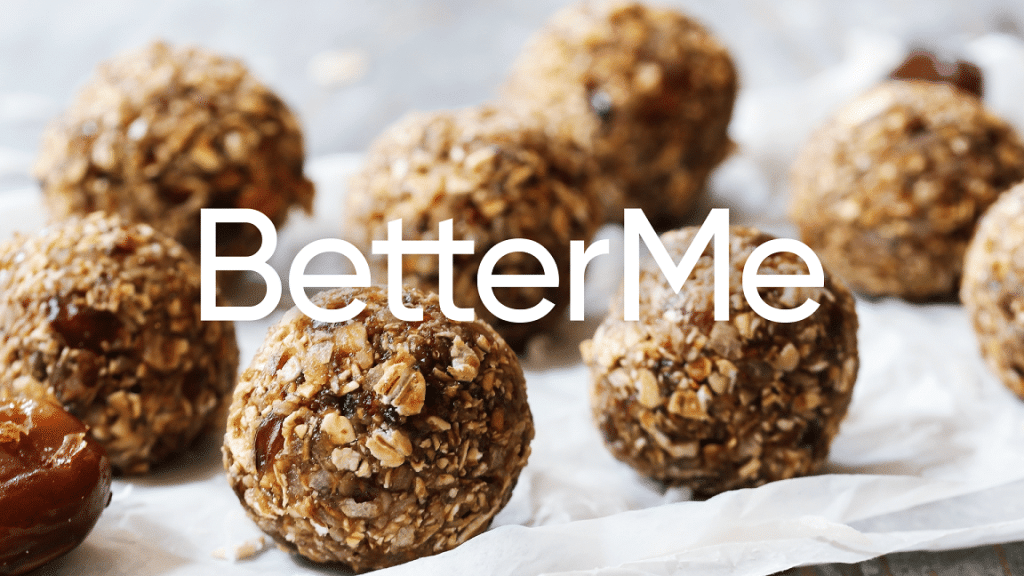Sunflower seeds are a common type of snack food people enjoy eating. They come in different flavors and can be eaten on their own or in other forms like sunflower seed butter. Regardless of how they’re consumed, there are many benefits that come with the consumption of these popular seeds. This article will go into detail about what you need to know about these nutritious little seeds.
Get your personalized
meal plan!
What Are Sunflower Seeds?
Sunflower seeds are the edible seeds of sunflowers that come in a variety of different colors, including black, white, and red. The most common type of sunflower seed is the black one, which is the kind that is typically used to make snacks like sunflower seed butter. Sunflower seeds are a good source of both protein and fiber, and they also contain healthy fats, minerals, and vitamins.
Sunflower Seeds Nutrition Facts
According to the USDA, 1oz of dry-roasted, unsalted sunflower seeds contains the following nutrients in the listed quantities (8):
- Calories: 165
- Total Fat: 14 grams
- Saturated Fat: 1.5 grams
- Monounsaturated Fat: 3 grams
- Polyunsaturated Fat: 9 grams
- Cholesterol: 0 milligrams
- Sodium: 1 milligram
- Carbs: 7 grams
- Fiber: 3 grams
- Sugars: 0 grams
- Protein: 5.5 grams
- Vitamin E: 7.4 mg (50% DV)
- Magnesium: 37 mg (9% DV)
- Vitamin C: 0.5 mg (4% DV)
- Calcium: 20 milligrams (2% DV)
- Iron: 1 milligram (6% DV)
Calories In Sunflower Seeds: Are They Bad For You?
As with any food, it’s important to be mindful of the calories in sunflower seeds. While one ounce may not seem like a lot, if you’re eating them as a snack, the calories can add up quickly. Additionally, because sunflower seeds are high in fat, they can also contribute to weight gain if eaten in excess.
The good news is that the fat in these seeds is mostly from healthy, unsaturated fats. In fact, the fats in sunflower seeds have been shown to be associated with a decrease in LDL cholesterol levels and improved cardiovascular health (1).
Read More: Flax Seeds Benefits: 10 Reasons Why You Should Eat This Superfood
Health Benefits Of Sunflower Seeds
Despite the fact that they contain some calories, sunflower seeds offer a number of benefits that make them worth including in your diet.
Good Source Of Protein
Sunflower seeds are a good source of protein, with 5.5 grams per ounce (8). This is beneficial for those who are looking for plant-based sources of protein. Building muscle, repairing tissues, and making enzymes are just a few of the functions that rely on protein. If you’re trying to lose weight or follow a vegetarian or vegan diet, sunflower seeds can be an excellent way to help keep your plant protein intake high (1).
Rich in Vitamin E
Sunflower seeds are rich in vitamin E, which is important for supporting the immune system and fighting free radicals that damage cells throughout the body. The antioxidant powers of vitamin E may have the potential to slow down cognitive decline as you age – meaning they may help protect against dementia. Some research has even found that higher intakes of vitamin E (from food, not supplements) may help prevent some types of cancer, so including sunflower seeds in your daily routine could go a long way toward maintaining good health.
Beneficial For Your Heart
Sunflower seeds are high in antioxidants, which can help protect against damage to your cells. They’re also a good source of vitamin E, an antioxidant which has been associated with better cardiovascular health. Consuming these seeds may help keep your heart healthy by reducing inflammation throughout the body, lowering blood pressure, and preventing cholesterol build-up on artery walls (1).
Help Lower Inflammation
Sunflower seeds are an excellent source of magnesium, which is key for maintaining healthy heart function. Magnesium deficiency has been associated with chronic low-grade inflammation(5). Getting enough magnesium can help prevent or reduce any inflammation that is due to a deficiency in magnesium.
May Help Improve Mood
The magnesium in sunflower seeds may help improve your mood and calm anxiety. Sunflower seeds also contain tryptophan, an amino acid which is converted to the neurotransmitter serotonin which may help improve sleep.
May Lower Blood Sugar
Sunflower seeds have chlorogenic acid, which works as an anti-inflammatory agent and may help lower blood sugar levels. Chlorogenic acid is also what gives sunflower seeds their flavor, so look for varieties that pack a little more of a punch (1)!
Studies also suggest that adding these seeds to the diet may help improve lipid profiles in people with diabetes. More research is needed to determine these seeds’ effect on blood sugar and type 2 diabetes (6).
Nutritious Snack Option
Although sunflower seeds are a high-calorie food, they provide you with important vitamins and minerals and provide a delicious snack alternative for those who want something more than what processed snacks have to offer. One ounce holds 165 calories and 14 grams of fat – most of which is from unsaturated sources, so including them as part of your diet can be a healthy choice (8).
Looking for a way to break the vicious cycle of weight loss and tone up all the jiggly parts? Watch the extra pounds fly off and your muscles firm up with the BetterMe app!
The Downsides Of Sunflower Seeds
While there are plenty of reasons to enjoy these seeds, there are some caveats to be aware of:
Calorie Content
Sunflower seeds are also high in cadmium, a heavy metal that can be harmful in large quantities. If you eat sunflower seeds in moderation (an ounce per day) you should have nothing to worry about (3).
Cadmium Content
Sunflower seeds are also high in cadmium, a heavy metal that can be harmful in large quantities. It’s important to only eat organic sunflower seeds if you’re worried about this, as conventionally-grown varieties may contain higher levels of the toxin (3).
Allergies
Some people are allergic to sunflower seeds, so be aware of any potential reactions if you plan on adding them to your diet. Symptoms can range from mild (itchiness, hives) to severe (anaphylaxis), so if you have other food allergies, it’s always best to consult with a doctor before trying them (7).
Bacteria In Sprouted Sunflower Seeds
Sprouting is a process that can increase the nutrient content of seeds, but it also makes them more susceptible to bacterial growth. If you choose to sprout your own sunflower seeds, be sure to do so in a very clean environment and monitor them closely for any signs of spoilage.
Some people have also been affected by a bacteria that’s been linked to sprouted sunflower seeds. Salmonella can cause diarrhea, fever, and abdominal cramps – so if you’re concerned about the potential effects of these sprouted seeds, it may be best to avoid them unless they’ve been thoroughly cooked (9).
Fecal Impaction
Eating too many sunflower seeds (or other fiber-rich food, especially without drinking enough water) can also lead to fecal impaction, which is a condition where stool becomes lodged in the rectum and can’t be expelled. If you experience any of the following symptoms, stop eating sunflower seeds and contact your doctor: constipation, abdominal pain, nausea, vomiting, or fever (4).
Sunflower Oil Spoils Easily
Sunflower oil can go rancid easily, which means it should be stored in a cool, dark place and used up relatively quickly. When oils are rancid, they can actually do more harm than good to your body – so it’s important to make sure you’re using them up before they spoil or discarding them if they do become rancid.
Read More: Benefits Of Pumpkin Seeds: 10 Reasons Why These Nutrient-Rich Seeds Should Feature In Your Diet
How To Eat Sunflower Seeds
There are a few different ways to enjoy sunflower seeds:
Raw
You can eat them raw as a snack, add them to salads, or use them in recipes.
Roasted
Roasting brings out the flavor of sunflower seeds and can make them a bit crunchier. They’re a delicious addition to trail mix or yogurt.
Ground
Ground sunflower seeds can be used in baking or as a coating for meat or fish.
For Baking
You can also mix ground seeds into batter, coating them first if you want something crunchy. You may also top the bread or pastries with them for added flavor.
Sunflower Seed Oil
Sunflower seed oil is a popular cooking oil that has a mild flavor and a high smoke point. It’s also rich in antioxidants, which can make it a healthier choice than other oils.
BetterMe app is a foolproof way to go from zero to a weight loss hero in a safe and sustainable way! What are you waiting for? Start transforming your body now!
Salad Dressing
Sunflower seeds and oil are also popular in salad dressings – they have a light, nutty flavor that pairs well with greens.
Sunflower Seed Butter
Sunflower seed butter is made from ground sunflower seeds and has a thick, creamy texture. It’s a great alternative to peanut butter and can be used in baking, as a dip, or spread on toast.
The Bottom Line
Sunflower seeds are a great way to add some extra nutrients to your diet. They’re high in protein, vitamin E, magnesium, and chlorogenic acid, and offer a range of health benefits. While they do contain some calories, they’re also low in carbohydrates and may help stabilize blood sugar levels. Sunflower oil is also high in polyunsaturated omega-6 fatty acids, which are essential nutrients.
Downsides include the fact that they’re high in calories and can go rancid easily. All in all, sunflower seeds are a delicious and nutritious addition to your diet that you should definitely try!
DISCLAIMER:
This article is intended for general informational purposes only and does not serve to address individual circumstances. It is not a substitute for professional advice or help and should not be relied on for making any kind of decision-making. Any action taken as a direct or indirect result of the information in this article is entirely at your own risk and is your sole responsibility.
BetterMe, its content staff, and its medical advisors accept no responsibility for inaccuracies, errors, misstatements, inconsistencies, or omissions and specifically disclaim any liability, loss or risk, personal, professional or otherwise, which may be incurred as a consequence, directly or indirectly, of the use and/or application of any content.
You should always seek the advice of your physician or other qualified health provider with any questions you may have regarding a medical condition or your specific situation. Never disregard professional medical advice or delay seeking it because of BetterMe content. If you suspect or think you may have a medical emergency, call your doctor.
SOURCES:
- A review of phytochemistry, metabolite changes, and medicinal uses of the common sunflower seed and sprouts (2017, biomedcentral.com)
- Benefits of Sunflower And Its Side Effects (2020, lybrate.com)
- Cadmium bioavailability from edible sunflower kernels: a long-term study with men and women volunteers (2001, pubmed.gov)
- Fecal impaction in adults: report of 30 cases of seed bezoars in the rectum (2006, pubmed.gov)
- Magnesium deficiency and increased inflammation: current perspectives (2018, nih.gov)
- Markers of cardiovascular risk in postmenopausal women with type 2 diabetes are improved by the daily consumption of almonds or sunflower kernels: a feeding study (2012, pubmed.gov)
- Sunflower seed allergy (2016, pubmed.gov)
- Sunflower seeds, plain, unsalted (2020, usda.gov)
- Survival of Salmonella during Production of Partially Sprouted Pumpkin, Sunflower, and Chia Seeds Dried for Dried Consumption (2018, pubmed.gov)












